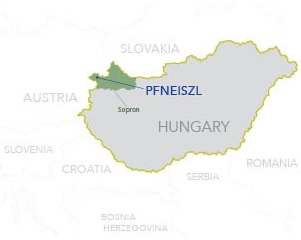2017 Pfneiszl Blaufränker
Burgenland, Austria

The young and charming sisters Birgit and Katrin Pfneisl, partners in Pfneiszl Winery are responsible for the equally charming Kékfrankos (AKA Blaufränkisch). Birgit is responsible for the vineyards and winemaking, Katrin marketing and sales. Born and raised in Austria, their grandparents fled their vineyards in Sopron to escape Communism and settled just across the border in Kleinmutschen, Burgenland, where the “z” was dropped from their surname. In 93’ the Pfneisl family re-acquired their Hungarian vineyards. Having since established Weingut Pfneisl, one of Austria’s premier red wine estates, Birgit and Katrin’s father Franz Pfneisl and his brothers, decided to give these ancestral vineyards to the sisters. After completing her University studies, Birgit set out to work far away from home. She made wine in Italy, Australia, New Zealand, South America and the US before returning home with dreams of an organic estate. Starting with the inaugural 04’ vintage, the Pfneiszl vineyards were farmed organically, in 09’ they were certified Organic. In addition to the fine Kékfrankos, Birgit makes the delightful frizzante Sparkelina, a stylish Merlot, and a range of thoughtful cuvees.
VINEYARDS
Sopron is an old Hungarian wine village just west of the southern tip of Lake Fertö (Neusiedler See). The prized vineyards around it are mostly Austrian, though what is Hungarian is ideal. Most of the Pfneiszl vineyards are in the dry farmed, slate and sand stone site of Kräftner. This south east facing slope was replanted about 12 years ago, healthy plots of old vines were left intact. Varieties include, numerous clones of Kékfrankos, some as old as 35 years, Merlot, Zenit (a local white grape), and small amounts of Sangiovese, Malbec, Zinfandel and Shiraz. Birgit employs a wide range of organic techniques ranging from standard practices like native crop cover to less conventional methods like insect pheromones. Birgit’s decision to pursue organic farming was at first controversial. Idealistic in nature, organic farming in reality is challenging and risky. So far, Birgit’s idealism and intuition are paying off.
WINE MAKING
Grapes are sorted and de-stemmed at the winery. Fermentation is conducted exclusively with native yeast. The Classic line of wines are fermented and aged in stainless steel while premium wines are aged in a combination of new and used oak, mostly of Hungarian or French stock. Malolactic fermentation is encouraged to finish though not demanded and a small amounts if residual sugar are permitted if a wine does not ferment completely dry. Most wines are lightly filtered.
NOTES & PAIRINGS
A little like Gamay, a little like Cab Franc, Blaufränkisch is a site expressive noble sort capable of profundity and fun. Birgit and Katrin Pfneisl are both. Rather than make wine with their father and uncles who run the well established family estate in Austria, the sisters decided to farm their ancestral vines in Sopron, Hungary, where Blaufränkisch is Kékfrankos and Pfneisl is Pfneiszl. Organic farming, old vines and wild fermentation, their wines contrasted sharply with those of their elders: lighter, prettier, less structured and more aromatic. Their Kékfrankos has always been more Blaufränkisch than most Blaufränkisch so we were happy to discover Birgit and Katrin's increasing involvement in the Austrian estate and immediately taken with the results. Blaufränker is that wine: a collaborative wine project between Blue Danube Wine Co and the Pfneisl sisters, born from the common goal of deepening our relationships with each other and this love-able grape.
ANALYTICS & PRONUNCIATION
PRODUCER: Pfneiszl (pha-nie-zull)
APPELLATION: Burgenland (show-pron)
VINTAGE: 2017
GRAPE COMPOSITION: 100% Blaufränkisch
CLIMATE: Continental
SOILS: Heavy loam soil
MACERATION & AGING: Two week fermentation and maceration in stainless steel. Aging in steel tank and a few 100 liters in Barrique barrels.
ALCOHOL: 12.8%
RESIDUAL SUGAR: 5.4 g/l
ACIDITY: 5.2 g/l
